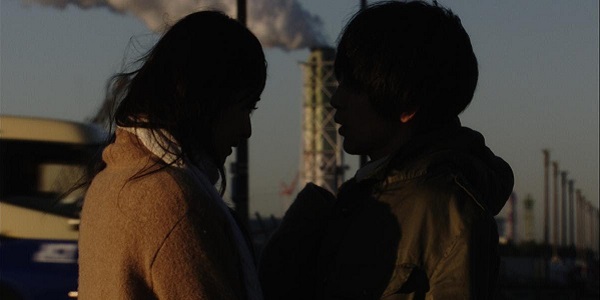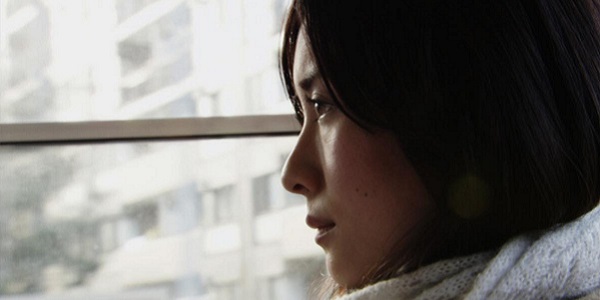PASSION: Exploring Early Hamaguchi

Lee Jutton has directed short films starring a killer toaster,…
From the tangled web of female friendships at the center of Happy Hour to the doppelgänger romance of Asako I & II, from the episodic explorations of intimacy that comprise Wheel of Fortune and Fantasy to the devastating examinations of grief and guilt in Drive My Car, Ryûsuke Hamaguchi is a master at ripping the guts out of human relationships and strewing them across the screen. It’s impossible to tear your eyes away from his films even in their most awkward and uncomfortable moments because you likely see some part of yourself up there among all the mess (and, in some strange way, may find that comforting).
Passion, which Hamaguchi made as his thesis film while earning his M.A. at the Tokyo University School of the Arts, shows the director already displaying a keen sense of empathy and understanding for all of the complexities inherent in modern relationships. Now being theatrically released in the United States for the very first time — fifteen years after it was first completed — Passion is not only a portrait of the artist as a young man but a snapshot of how complicated love and life can be in one’s late twenties.
A Crisis of Commitment
Passion opens with high school teacher Kaho (Aoba Kawai, who also appears in Wheel of Fortune and Fantasy) and academic Tomoya (Ryuta Okamoto) in a cab on their way to a party at a restaurant. There, the couple announces that they are engaged to be married. But instead of a purely celebratory mood, the news causes a bit of drama among their tight group of friends, all of whom are on the cusp of turning thirty. It turns out that Tomoya had an affair in the past, while their friend Kenichiro (Nao Okabe, who also appears in Asako I & II), has long been in unrequited love with Kaho.

After the party, Tomoya heads to the home of his friend Takako (Hamaguchi regular Fusako Urabe), with whom he is secretly in love; however, Takako only has eyes for Kenichiro, who unfortunately doesn’t share her feelings. Meanwhile, married father-to-be Takeshi (Kiyohiko Shibukawa) is instantly intrigued by Takako’s spunky aunt, a successful novelist. A long night of drinking leads to many revelations that have repercussions around their social circle throughout the days that follow — especially for Kaho and Tomoya, whose relationship remains stuck at a crossroads.
What Now?
Across a series of long, drawn-out scenes full of incisive dialogue — the kind where telling the truth is presented more as a fun party game than as a habit of a healthy lifestyle — Passion depicts the struggles one goes through when adulthood is on the horizon but one isn’t quite ready to accept it. Is it worth sabotaging one’s hard-won security for one last grasp at the ideals of one’s youth, such as that dream job or perfect romance that one always dreamed of but never quite obtained? Such is the saga of Tomoya, Kuho, and their friends. Tomoya is happy with Kuho, but he doesn’t love her in the passionate, all-consuming way he feels he is supposed to. Kuho wants to quit her job as a teacher, too emotionally drained by the troubles of her students, but if she does, she has no idea what else to do with her life.

One of the most powerful scenes in Passion involves Kuho speaking to her class about a student who recently committed suicide. The conversation concerns violence, and the different types of it, and ends with the eventual reveal that almost everyone in the classroom had committed an act of violence towards their deceased classmate. More than anything else in Passion, it feels like a signature Hamaguchi scene, the kind that are the centerpieces of his later works—think the scene in which the student reads the professor’s sexually explicit writing out loud to him in Wheel of Fortune and Fantasy, or the sign-language performance of Uncle Vanya that is the climactic moment of Drive My Car. It’s a lengthy scene, with more questions raised than answers given, and it’s absolutely devastating.
Passion contains many other moments that hint at the Hamaguchi to come, but as one would expect from a graduate student film, it does lack the polish of his later work. The film is shot on scrappy, lo-fi digital video that cements it not only as a student film but one of a very specific time period. Yet despite the fuzziness of the images, one can still appreciate how Hamaguchi uses long takes, close-ups, and wide shots for maximum emotional impact. I love those moments where his characters exit or enter (or, in the film’s final, pivotal moments, abruptly re-enter) a lingering static frame, and the way those scenes emphasize the passage of time and the space in which these characters exist.

Even in these early days, Hamaguchi displays his rare talent for working with actors. The entire cast gives nuanced, naturalistic performances, such that even a frustrating character like Tomoya—who often behaves in ways that make him seem unworthy of the sweet, good-natured Kuho—is not entirely undeserving of one’s sympathy. After all, Hamaguchi understands that it is part of human nature to perform for others, to try and mask our insecurities and anxieties in a social situation to seem like a better version of ourselves.
Conclusion
A fitting precursor to his later masterworks, Passion is guaranteed to whet one’s appetite for Ryûsuke Hamaguchi‘s next movie, whenever that may be.
What do you think? What is your favorite Ryûsuke Hamaguchi movie? Share your thoughts in the comments below.
Passion opens on April 14, 2023 at Film at Lincoln Center in New York and at The Laemmle in Los Angeles before expanding to additional markets.
Does content like this matter to you?
Become a Member and support film journalism. Unlock access to all of Film Inquiry`s great articles. Join a community of like-minded readers who are passionate about cinema - get access to our private members Network, give back to independent filmmakers, and more.
Lee Jutton has directed short films starring a killer toaster, a killer Christmas tree, and a not-killer leopard. Her writing has appeared in publications such as Film School Rejects, Bitch: A Feminist Response to Pop Culture, Bitch Flicks, TV Fanatic, and Just Press Play. When not watching, making, or writing about films, she can usually be found on Twitter obsessing over soccer, BTS, and her cat.













